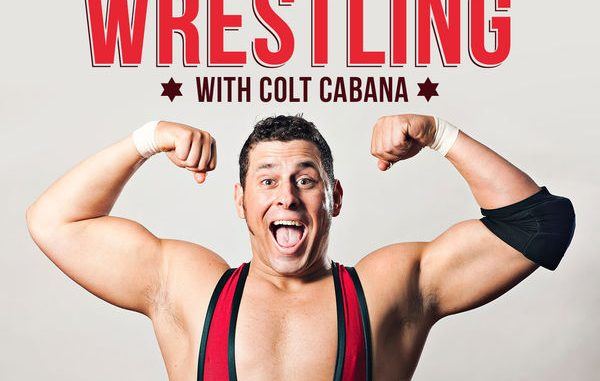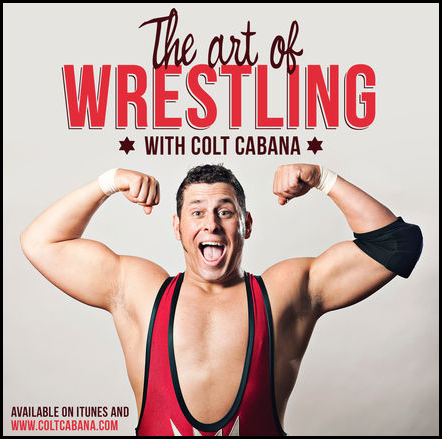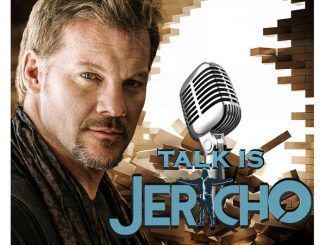
Art of Wrestling Episode 370
Guest: Frankie The Mobster
Release Date: October 12, 2017
Recap by: Tony Flores
Direct Link to Listen/Download
Show Highlights/Rundown
- Frankie explaining the importance of standing out in wrestling
- Working in an asylum
- Dealing with mental health and substance abuse
- His tryout with WWE and their audition process for highly regarded independent wrestlers
- A story with Sami Zayn in Toronto
- How the wrestling business helped shape him as a person
Introduction
Colt begins with the introduction of the show and plugs sponsors. He introduces Frankie The Mobster, mentioning fans at large may not know who he is, but fans in Montreal are familiar with him. Colt mentions Frankie being a throwback to a different generation when “men were men, this is how it should be, this is how workers work; he would easily assimilate in a locker room in the 1970s in Cobo Hall with The Sheik and Bobo (Brazil).” This is in juxtaposition to current generation stars who have been criticized for being nerds and enjoying video games.
Frankie is also an actor, spotlighting Bad Santa 2. Colt mentions he’s turned down auditions for various projects due to having bookings. “I’m a big believer in my word is my word; my booking is my booking.” This attitude has helped him have a lengthy career in independent wrestling since 2003.
Song of the week: “Salmon Blazer” by Jerry and the Lawlers
Interview
Colt asks about Frankie rings, commenting it looks like brass knuckles. Frankie jokes he can pleasure the opposite sex with them. He mentions it’s all for show. He just started a new job as a car salesman as he’s not making a living in wrestling. Colt asks Frankie about wearing all the rings for show, referring to it as peacocking, Frankie explains he does it to get noticed, liking the attention.
To the American audience, Frankie is known as Kevin Owen’s friend who swears. He is actually the godfather to Kevin’s son. As being known for boisterous and foul mouthed promos in the past, he looks to put more depth into current ones, the catalyst for change being his acting work, not using vulgarity for vulgarity’s sake.
As they switch gears to wrestling, they discuss the need to standout, as performers should be superheros. As Frankie sees himself as a actor in the ring, he is selling the fans emotions. He makes the analogy to theater, referring to the audience as clients rather than fans. Each individual spends their money to see a performance, buying the product the wrestlers are selling. He’s a fan of giants, mentioning Kevin Nash, Sid Vicious, and Braun Strowman, the larger than life characters.
Frankie enjoys the great talkers, singling out Roddy Piper and Ric Flair. Even having done a Piper’s Pit segment and receiving feedback from Piper himself “why the f**k aren’t you on TV?”, noting this as the biggest compliment of his career.
Frankie started wrestling in Montreal at 16 (38-years-old now). As a small guy, he was surrounded by large wrestlers telling him to be bigger. Having an arrogant nature to him, he would dissuade other wrestlers’ critiques, “I’m f**king good, f**k you you fatties. I can go faster than you, I can go better than you, I can talk better than you.” He changed his character due to working mostly in Quebec, while maintaining intensity, he no longer talked. He likened it to Javier Bardem’s character from No Country For Old Men, wanting to scare his opponents and the audience to further standout.
Going so far as to use claws during his entrance, Colt asks him if he has confidence knowing he has the claws to use in everyday life if anyone ever bothers him. Frankie jokes he wears them when he walks his dog, being hilarious as he walks his Pomeranian. He would hastily go home so no one would call the cops, thinking he’s crazy.
Frankie previously worked in an asylum for the criminally insane. As Colt asked why he would take a job in an asylum, Frankie notes fascination as his main reason. He started as a janitor, he and Colt joking he started putting equations on the board like Matt Damon in Good Will Hunting. Working previously as a bouncer, he no longer had patience for it. Working at the asylum, while still dangerous, the people don’t have control over their mental faculty. He enjoyed being around them, getting inspiration as both an actor and as a wrestler, garnering so many ideas. Frankie tells the story of an inmate who while friendly with him, threw semen at Frankie, with the inmate smiling back at him the whole time.
Frankie admits he has borderline personality disorder, attuning it to being Bipolar, experiencing extreme highs and lows. This compounding stress in the wrestling business with not getting his own hopes up. Frankie mentions he had three tryouts with WWE, expressing his frustrations about getting his hopes up on not succeeding on his tryout. Frankie owns the reasons why he didn’t make it to WWE. Not blaming his failure at a tryout because someone didn’t like him, he knows his worth. He explains if he made the proper efforts and sacrifices, he would have had a job.
He mentions a tryout in Ottawa happening before a house show which consisted of drills. Frankie is dumbfounded by highly regarded independent stars such as Roderick Strong, Adam Cole, Chris Hero having tryouts, explaining if the WWE approached them, they know what each one is worth. He understands the difference between someone just starting out or doesn’t draw money has to tryout, but why do these guys have to do jumping jacks and hindu squats in order to get a job. Colt counters Frankie’s point saying it’s more about their mentality, seeing if they will complain about the work. As a retort, Frankie wonders the warrant of a tryout, if it’s about showing the will to make it in the business by suffering injuries and working for 15 years is enough to prove you have the dedication.
Frankie talks about his mellow personality. He has zero tolerance for bullies. There’s a perception of him being aggressive and violent, however, anyone who has shared a locker room with him can you he’s one of the friendliest guys, hugging everyone. As his career hasn’t turned out the way he wanted it after twenty two years, he’s turned to acting. As he doesn’t feel like he could make it to WWE, even though he knows a guy, Frankie criticizes the Wellness Policy, claiming he would never pass it, “I’m a violator.” He can’t believe the company would make the public believe there are no steroids in wrestling. He explains some guys on TV are utilizing steroids, as wrestling is a physical and ascetic business to maintain a superhero physique, that’s an old school mentality.
Frankie switches gears to a story with Sami Zayn in Toronto. He mentions he’s generous by nature, especially when it pertains to homeless people who have had misfortunes. His tune changes, however, for a man who has a sign claiming to want money for a drink. He has no respect for him. As he passes by the gentleman with the sign, Sami is going through his pockets for money to give to the man. He turns to Frankie, asking if he is going to help him. He proceeds to spit in his hat, much to the dismay of Sami. He explains the spit would hopefully send a message to the man to make an effort to better himself. Colt jokes saying the guy who threw semen at Frankie was a way to change his life, to which Frankie is very protective of his “jizz.”
Colt mentions Frankie’s battles with adversities. Frankie acknowledges his mistakes and owns up to them. He speaks about his relationship problems. He’s great with kids, putting them in-between animals and plants on his scale of love, followed at the end with everyone else. He explains his substance abuse is only his fault, as it has affected his relationships with women, triggered by his insecurities. A recent bicep tear put a lot of things in perspective for him. His older brother committed suicide after struggling with drugs and alcohol, which is why Frankie doesn’t drink anymore. He lost $350,000 being over generous with friends and abusing alcohol, where his brother used the money to open a restaurant and become a chef after getting clean from drugs.
Frankie knew he had to get clean as he would lose control once he started drinking. He’s been sober for over six years. That was put to the test as he consumed alcohol at a friend’s wedding. He drank, but he controlled himself, as he saw this as progress from where he’d come previously.
Colt circles back to wrestling, asking if the business molded who he is. Frankie mentions he’s lost so many friends. Referring to his persona, he likens it to Bret Hart where he became the character in real life. He claims to be a geek. Studying drama and getting people’s attention is what he was good at it, this passion drives him as a person. Traveling outside of Quebec made him a better wrestler/performer. He mentions he speaks with his therapist about how it is extremely unhealthy to illicit a reaction from people in public for the sake of attention. He still struggles with his insecurities as he hides behind his wrestling character. Frankie talks about a scene he filmed for a TV show which involved a violent interaction. After finishing the scene, he was exhausted, “little Mark [his real name] would never do this s**t.”
They close the interview with Frankie’s social media plugs. Harkening back to a quote from Kevin Owens about listening to Jim Ross is how he learned English, Frankie explains he learned it in school where half the semester is in English and the other half in French, from there, he only watched English TV and worked for phone agencies. This is important to his professional life in and out of wrestling.
Quotes:
Referring to himself to the American audience: “I’m Kevin Owen’s son’s godfather, and the crazy guy who spits at six year olds at PWG, and the guy who cuts promos at CZW using a lot of F and C words.”
“Wrestling’s not about wrestling… I see myself as a actor more than I do as a wrestler.”
On speaking about wrestlers not getting contracts from WWE tryouts: “Anybody that has a talent/potential/assets/requirements to be a star, goes there, shows them what they got, and doesn’t make it, can only blame themselves because he f**cked up at one point.”
On the manner in which standout independent wrestlers can get hired by WWE: “If you know the guy’s worth money, he’s made money, sign him up. Have him work f**king matches, have him work with your f**king kids, that or he’s gonna make you money that way, he’s not going to make you money doing drills. You know the guy can make you money, don’t drill him. And if you know that if he’s there at your f**king performance center and you brought him there, you know what he’s worth”.
On wrestling as a performance: “if a kid comes over, smiling, looking at me with that big smile, ‘you’re amazing’, that’s my payday.”
Score and Review [7/10]
This is an introspective on Frankie The Mobster as a wrestler in the business and as a man’s journey through life. Frankie is open about his challenges with mental health as well as substance abuse which affected his past and current relationships. He shares these stories not as a cautionary tale, but as a man navigating the rough road of life. I found it very captivating as his personality draws you in with each story, and relatable for listeners who have struggled with different challenges in their lives. Due to some of the heavy nature of the interview, this could be a turnoff for some listeners. I would recommend the podcast for a wrestling fan, and for fans of the underdog overcoming adversity.
Time Stamps
0:00: Introduction and Sponsor Ads
8:25: Song of the week
10:25: Interview begins
15:40: Thoughts on wrestling
24:10: Working in an asylum
33:55: Tryout with WWE
39:40: Sami Zayn story
42:02: Battling adversity
51:38: How wrestling molded Frankie
1:00:12 Conclusion and plugs
About the Writer
Tony Flores is a writer, musician and gamer from New York City. His earliest memories of wrestling were watching watching Royal Rumble 1994, watching WWE Superstars on Saturdays, and seeing house shows at Madison Square Garden. Away from wrestling, he is a performing musician in New York, and can be found gaming on Twitch. You can follow him @itsmeprettytony on Twitter.
For more, check out our archive of The Art of Wrestling.



Awesome review of the Cabana podcasts.
Sometimes I don’t have the time to listen.
Well written and thorough.
Keep up the good work guys!